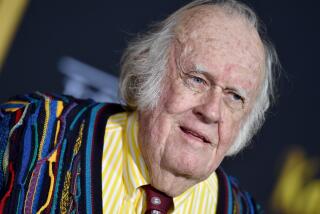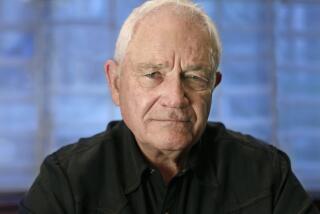From the Archives: Broderick Crawford, Oscar Winner in 1949, Dies at 74
Broderick Crawford, who won an Academy Award as best actor of 1949 for his role as a ruthless, scheming Southern political boss in “All the King’s Men” but was better-known to recent generations as the beefy chief of television’s “Highway Patrol,” died Saturday at Eisenhower Medical Center in Palm Springs.
Crawford, 74, had suffered a series of strokes after one at a 1984 New Year’s Eve party. He had been hospitalized at the medical center since earlier this month.
The gravel-voiced Crawford was comparatively unknown to film audiences at the time that he was chosen to portray the uncouth but guileful Willie Stark in the film version of Robert Penn Warren’s Pulitzer Prize-winning novel. He attracted rave reviews for his performance in what Life magazine called the “most exciting film to come out of Hollywood” that year. The movie, too, won an Academy Award as the best film of 1949.
Crawford had made numerous films before “King’s Men” and continued to make countless others afterwards, but he never again matched the critical acclaim he achieved in that movie, based loosely on the life of Huey Long, the populist governor of Louisiana and briefly a U.S. senator who was assassinated in 1935 in Baton Rouge.
However, Crawford’s greatest popularity came not as a film actor but as a television performer. From 1957 to 1967, he played the fast-talking Sgt. Dan Matthews in “Highway Patrol.” He later made two other television series, neither of which had the impact of the one in which his trademark was the expression “Ten-Four, Ten-Four,” which in police talk means, “I understand.”
He was born William Broderick Crawford in Philadelphia, heir to an impressive theatrical tradition. His mother was the comedienne Helen Broderick, who first starred on the Broadway stage and later in films. His father, Lester Crawford, had a long career in vaudeville and sometimes toured with his wife as Broderick and Crawford. His maternal grandparents were singers.
His parents did not raise their husky son to be an actor, even though he had a desultory grammar school education because he toured with one or the other--or both.
Sent to Prep School
Rather, the Crawfords sent the boy to a New England prep school, where he won letters in football and baseball and captained the swimming team. But upon his graduation, he joined his parents on a vaudeville tour and played minor parts in various sketches. They insisted, however, that he resume his education. He enrolled at Harvard—where he remained for three weeks until he decided that he was not suited to the academic life.
He moved to New York City, where he worked for a time as a stevedore, then spent about seven months as an able-bodied seaman aboard a tanker before obtaining occasional parts in radio dramas.
After that he turned to the stage, where he had some minor successes before obtaining a role that presaged the film celebrity that he would enjoy a dozen years later after the filming of “All the King’s Men.” He created the role of the dimwitted Lennie in the 1937 theatrical version of John Steinbeck’s novel, “Of Mice and Men.”
The role in the film version of that drama went to Lon Chaney Jr., but Crawford moved to Hollywood anyway and played tough-guy roles in a series of B pictures and Westerns before joining the Army in 1942 and serving overseas as a sergeant for 18 months, fighting in the Battle of the Bulge.
After World War II, he returned to Hollywood and was active in much the same kind of films that he had made before joining the Army.
When director-producer Robert Rosen was looking for an actor to play Willie Stark, he did not want a big box office star. He opted for the powerfully built, raspy-voiced Crawford, who helped prepare for the part by studying newsreels and still photographs of Huey Long.
“All the King’s Men” and its principals received more than 30 awards, including the Academy Awards. Mercedes McCambridge, a radio actress in her first movie role, won an Oscar as best supporting actress.
Appeared in ‘Born Yesterday’
Crawford followed that performance with a radical change of pace as the corrupt junk dealer opposite Judy Holliday in the 1950 comedy “Born Yesterday,” reverting to type as a tough in “The Mob” in 1951.
His film career drifted, and he was out of the spotlight until “Highway Patrol,” one of TV’s most popular syndicated programs. Crawford was the only regular character in those 156 episodes in which an array of crooks were captured, usually after a long chase. He also starred in two other series, “King of Diamonds” and “The Interns.”
For most of the 1960s Crawford worked in Europe in a succession of low-budget Western and adventure pictures.
Crawford married singer Kay Griffith in 1940. They were divorced in 1958, and she was granted custody of their two sons, Chris and Kelly. Crawford married twice after that.
Medical center officials said Chris and Kelly were with their father when he died. They said Kay Crawford and his current wife, Mary, were at the hospital. Funeral services were pending.
From the Archives: Movie Great Ginger Rogers Dies at 83
From the Archives: The Master of the One-Liner
From the Archives: Bette Davis Dies in Paris at 81
From the Archives: Gloria Swanson, Queen of Movies’ Golden Years, Dies
From the Archives: James Cagney, Legend of Movies, Dies at 86
More to Read
Start your day right
Sign up for Essential California for the L.A. Times biggest news, features and recommendations in your inbox six days a week.
You may occasionally receive promotional content from the Los Angeles Times.






